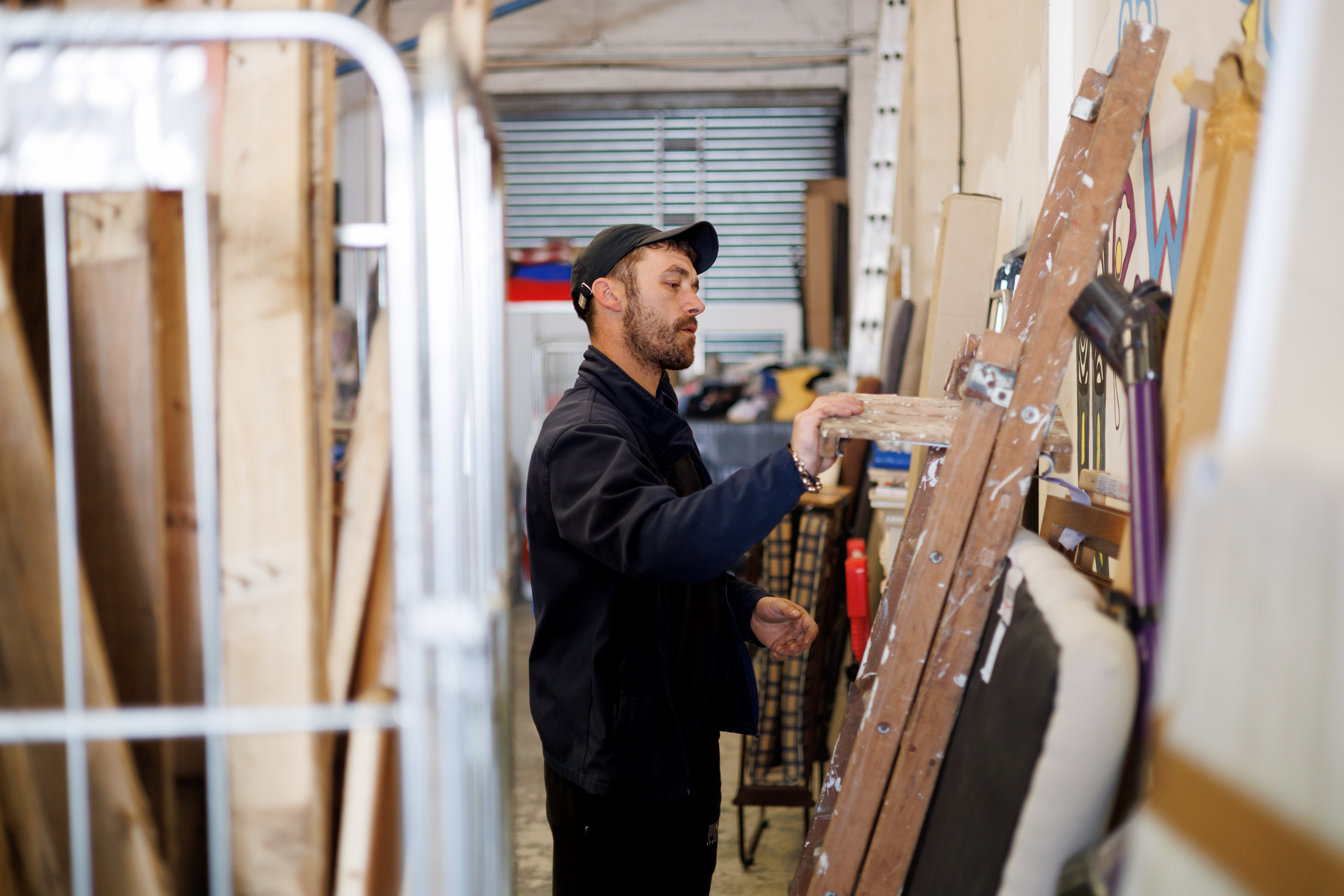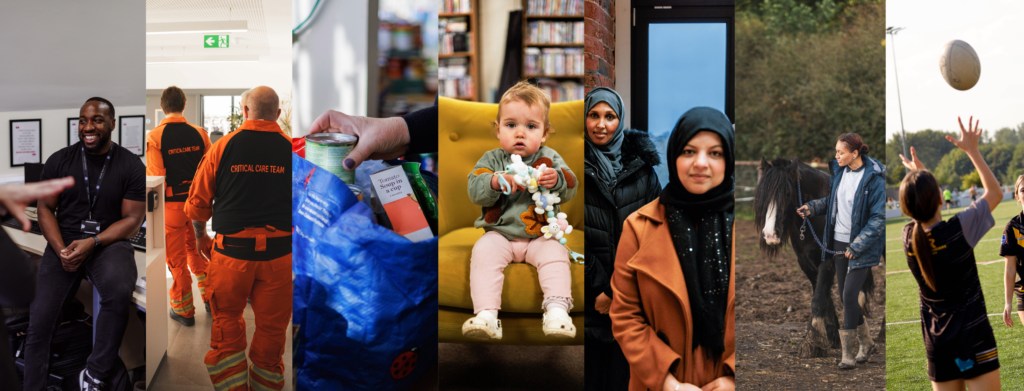
A CEO’s perspective: reducing running costs by move from renting to ownership
NewStarts’ aim is to support people through moments of crisis. The Bromsgrove-based charity provides furniture, food and household supplies to people who desperately need them.
NewStarts borrowed £280,000 from Charity Bank, which along with a loan from Big Issue Invest, meant the charity could buy its warehouse and invest in its staff. NewStarts’ CEO, Marion Kenyon, explains how the loans have saved the charity £15,000 a year.
Why did you decide to buy your main site, rather than continue renting it?
We were coming up to our five year review. The rent had gone up every year and we knew it would go up again. There was a chance we’d need to move, but there aren’t many large warehouses in Bromsgrove available to rent.
We had an agreement in place with the landowners that they would sell the warehouse to us at an affordable price if we wanted to buy it. I spoke to Charity Bank and they said they could loan us 75% of what we needed and Big Issue Invest said they’d cover the rest.
What made you decide to take out loans rather than relying on other income?
Grants are reasonably unpredictable and it’s hard to find them when you’re under a time constraint, which we were. The landowners had made a lot of money on the land opposite, so they were keen to sell our site and had started getting people in to look at the property. Thankfully no one else put an offer in!
Have you saved money by buying rather than renting?
Yes, we were paying around £38,000 a year, but were expecting that to go up to £45,000. Our loan repayments are around £30,000 a year, so it’s a significant saving.
We also borrowed slightly more than the purchase price to give us some extra funds.
We’ve been able to employ a second driver, so we’re not relying on volunteers as much and know exactly when we can offer deliveries. We’ve also been able to offer our other driver some extra training in warehouse management, which is useful for succession planning. Finally, we’ve been able to employ an IT person.
We need to make the most of our own income as grants are becoming more and more difficult to come by. Ideally, we’d like to be in a position where 90% of our income is self-generated. We’re not there yet but hope to be. It’s the only way forward as we can then grow how we want to, as we won’t be reliant on outside funding.
What other benefits have you seen?
It’s good to have an asset. The value of the land is going up, so if the project ever comes to an end we can sell the property and have money to put towards another project.
Have you expanded since you took the loan out?
Yes, we’ve just launched into Birmingham. We’ve started taking surplus food from shops and offering it to people who need it. In the holidays, families were watching to see when food was available so they could come straight over. In the future, we’d like to be able to prepare meals for the community and teach people how to make nutritious, cheap dishes.
How did you weigh up the risks and benefits of taking out a loan?
The benefits far outweighed any risks. The loan was taken against the building and the land. If everything goes terribly wrong, we know we can sell the building to pay off the loan without any problem, as there’s a real demand for warehouses in the area.
However, it was the first time we’d taken out a loan and at the time the risks felt huge. It seemed like an incredible amount of money, which was quite daunting.
Did you need to get the trustees on board before applying? If so, how did you gain their support?
A couple of them were OK and keen to do it from the start. Once we had the figures and knew that the rent would be going up and the loan repayments would be so much cheaper, it became something no one could really argue against.
“Why would you want to pay more and not own the building? It makes no sense”
We’d talked about buying for a couple of years, which made it easier. That warming up process can take time.
Why did you choose Charity Bank for the loan?
Bigger banks are only interested in the bottom line. They don’t care if you have an issue with volunteers not turning up. If I rang a high street bank and said I had a problem, they wouldn’t really care. Charity Bank understands the sector. For me, it’s important that I can ring up and someone knows who we are.
“Bigger banks are only interested in the bottom line”
So it’s important to you to have a named relationship manager, in this case Peter Hughes?
It’s absolutely helped having that one person. When we were going through the process, Peter offered advice and I knew he’d always come back quickly if I had a question.
Even now, he’ll still pop in for a chat to see how things are going. You don’t expect that from a banker!
We can be very honest with each other and talk things through. It’s a very different relationship than we’ve previously had with banks and grant holders.
How did you find the process of applying for a loan?
It took longer than I expected. We were getting finance from two very different organisations. Charity Bank is more like a bank and Big Issue Invest is more like a funder. Sometimes they wanted the same sort of information but not always.
When we got the phone call to say Charity Bank would accept us, it was a huge relief.
Were there any challenges you had to overcome?
Understanding the terminology was a challenge. We’re a small charity, so often I was having to do it all and I didn’t always understand how to produce everything in the way that was required. It meant there were a lot of emails going back and forth at the start. Sometimes deadlines can be challenging, particularly nearing the end of the process.
What would you say to other charities who are thinking about moving from renting to ownership?
Do the basic calculations. What’s your rent? What would the monthly loan repayment be? You can get rough figures using online calculators. If the loan repayments are cheaper then it’s a no brainer really.
You need to be prepared that the process will take a lot of your time. Can you allocate the time, or do you need someone to do it? It needs to be someone who knows your organisation well.
What’s next for NewStarts?
Now we’ve launched into Birmingham, we want to expand what we do there. We’re thinking about what that could look like. It might need to be slightly different than what we do in Bromsgrove, to cope with the congestion charge for example. The outputs will stay the same, but we might have to work differently to deliver them.
Then we’ll start to think about replicating our services elsewhere. What can we do to support communities? Do we want to get involved in housing itself? It’s never been the right time before but might be something to consider.
The value of our warehouse has gone up and we’ve paid off some of the loan, so we could put our spare capital towards something else. If we buy more properties we could build up a portfolio of assets to be used for the public good.
About Charity Bank
Charity Bank is the loans and savings bank owned by and committed to supporting the social sector. Since 2002, we have used our savers’ money to make more than 1280 loans totalling over £500m to housing, education, social care, community and other social purpose organisations.
Nothing in this article constitutes an invitation to engage in investment activity nor is it advice or a recommendation and professional advice should be taken before any course of action is pursued.


